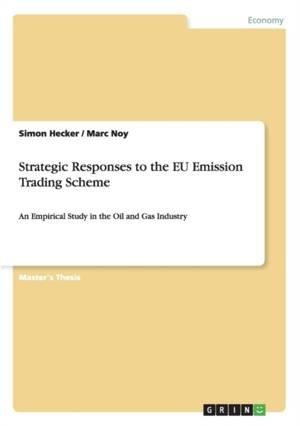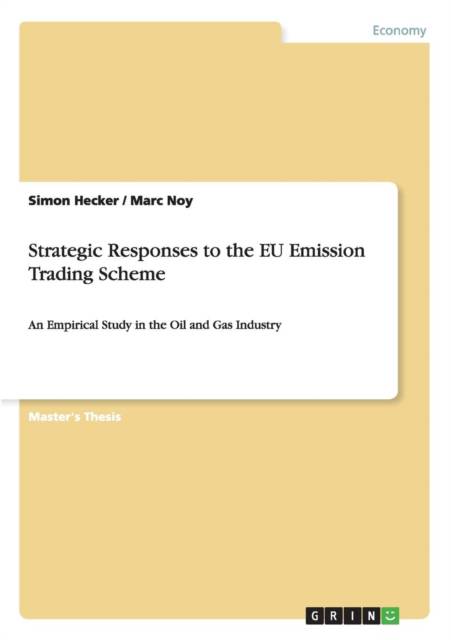
- Afhalen na 1 uur in een winkel met voorraad
- Gratis thuislevering in België vanaf € 30
- Ruim aanbod met 7 miljoen producten
- Afhalen na 1 uur in een winkel met voorraad
- Gratis thuislevering in België vanaf € 30
- Ruim aanbod met 7 miljoen producten
Zoeken
Strategic Responses to the EU Emission Trading Scheme
An Empirical Study in the Oil and Gas Industry
Simon Hecker, Marc Noy
Paperback | Engels
€ 55,45
+ 110 punten
Omschrijving
Master's Thesis from the year 2011 in the subject Economy - Environment economics, grade: 1.1, course: International Business, language: English, abstract: Emitting half of the greenhouse gases in industrialised countries, the oil and gas sector plays a central role in global GHG emissions. Environmental regulations such as the EU ETS emerged to fight climate change by reducing GHG emissions. Although those regulations increasingly affect oil and gas companies, specific implications of the EU ETS on business strategies are widely unknown. Therefore, this dissertation explores strategic responses to the EU ETS and analyses the impact of the regulation on the oil and gas sector. A strategic response framework, derived from the literature review, provides the basis for the analysis and is consequently adapted to the research findings. Empirical case studies of BP and Shell, combine secondary data and expert interviews to identify and further outline specific responses to the EU ETS. The research findings indicate that the EU ETS significantly impacts business strategies of oil and gas firms. The resulting strategic responses are mainly influenced by regulatory pressure, economic factors and competitive implications. Responses in various corporate, managerial and operational areas could be identified. From a corporate perspective, oil and gas companies support the EU ETS, as a trading scheme for carbon is preferred to other options, such as carbon taxes. Managerial responses comprise the introduction of environmental risk management systems, incorporating a carbon price into investment decisions, and the establishment of carbon trading teams, mitigating the costs of the EU ETS. Operationally, oil and gas firms responded directly by engaging in carbon trading and investing in Carbon Capture and Storage technologies. While, process improvements and lower emission generating products such as natural gases and biofuels are responses triggered by the EU ETS, investments
Specificaties
Betrokkenen
- Auteur(s):
- Uitgeverij:
Inhoud
- Aantal bladzijden:
- 148
- Taal:
- Engels
Eigenschappen
- Productcode (EAN):
- 9783656040781
- Verschijningsdatum:
- 29/10/2011
- Uitvoering:
- Paperback
- Formaat:
- Trade paperback (VS)
- Afmetingen:
- 148 mm x 210 mm
- Gewicht:
- 199 g

Alleen bij Standaard Boekhandel
+ 110 punten op je klantenkaart van Standaard Boekhandel
Beoordelingen
We publiceren alleen reviews die voldoen aan de voorwaarden voor reviews. Bekijk onze voorwaarden voor reviews.








